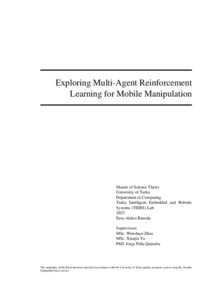Exploring Multi-Agent Reinforcement Learning for Mobile Manipulation
Rantala, Eetu (2023-10-24)
Exploring Multi-Agent Reinforcement Learning for Mobile Manipulation
Rantala, Eetu
(24.10.2023)
Julkaisu on tekijänoikeussäännösten alainen. Teosta voi lukea ja tulostaa henkilökohtaista käyttöä varten. Käyttö kaupallisiin tarkoituksiin on kielletty.
avoin
Julkaisun pysyvä osoite on:
https://urn.fi/URN:NBN:fi-fe20231027141684
https://urn.fi/URN:NBN:fi-fe20231027141684
Tiivistelmä
To make robots valuable in our everyday lives, they need to be able to make good decisions even in unexpected situations. Reinforcement learning is a paradigm that aims to learn decision-making models for robots without the need for direct examples of the correct decisions. For this type of robot learning, it is common practice to learn a single central model that controls the entire robot. This work is motivated by advances in modular and swarm robotics, where multiple robots or decision-makers collaborate to complete a task. Instead of learning a single central model, we explore the idea of learning multiple decision-making models, each controlling a different part of the robot. In particular, we investigate whether providing the different models with different sensing capabilities helps the robot to learn or to be robust to perturbations. We formulate these problems as multi-agent problems and use a multi-agent reinforcement learning algorithm to solve them. To evaluate our approach, we design a mobile manipulation task and implement a simulation-based training pipeline to produce decision-making models that can complete the task. The trained models are then directly transferred to a real autonomous mobile manipulator system. Several experiments are performed on the real system to compare the performance and robustness against the usual central model baseline. Our experimental results show that our approach can learn faster and produce decision-making models that are more robust to perturbations.
